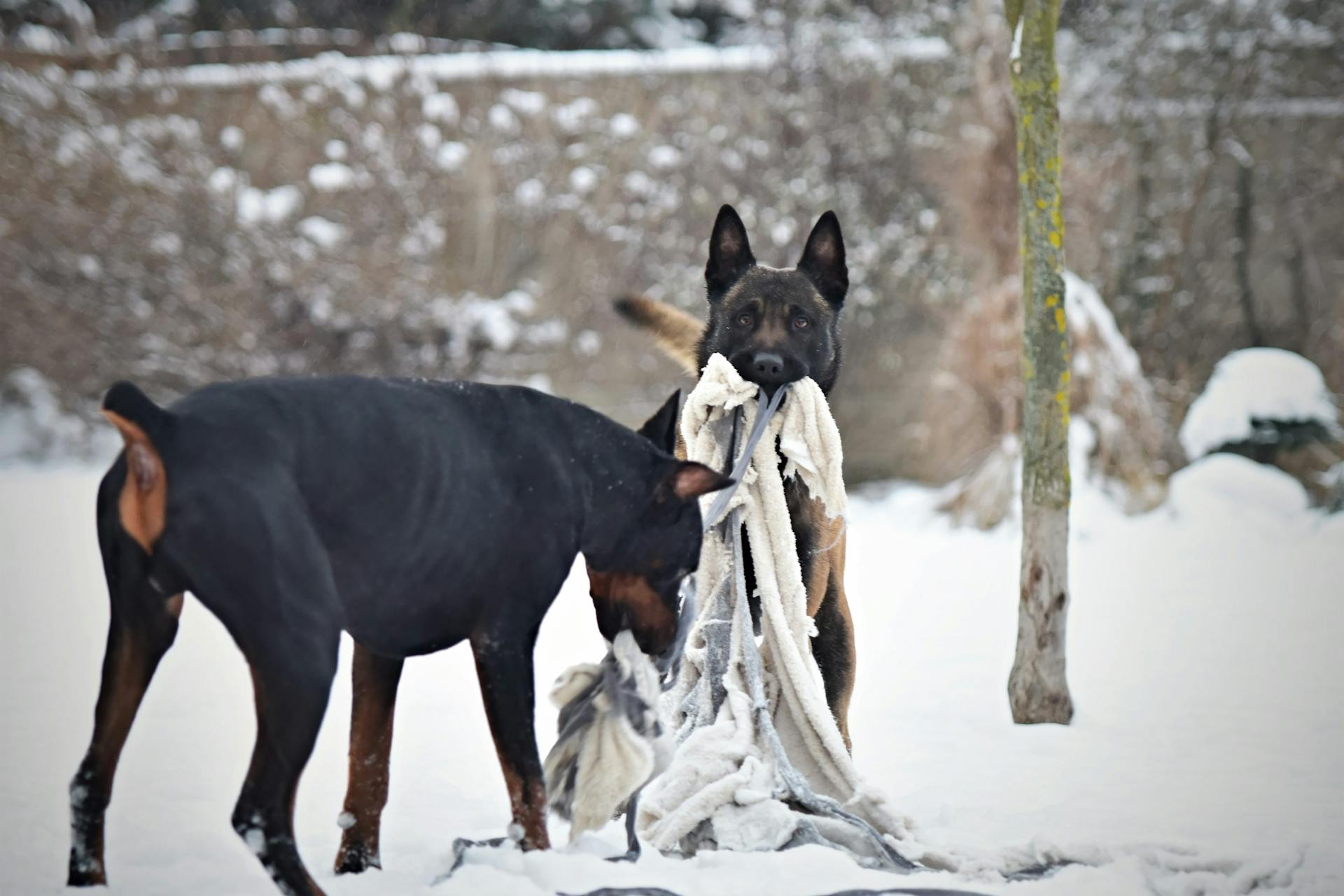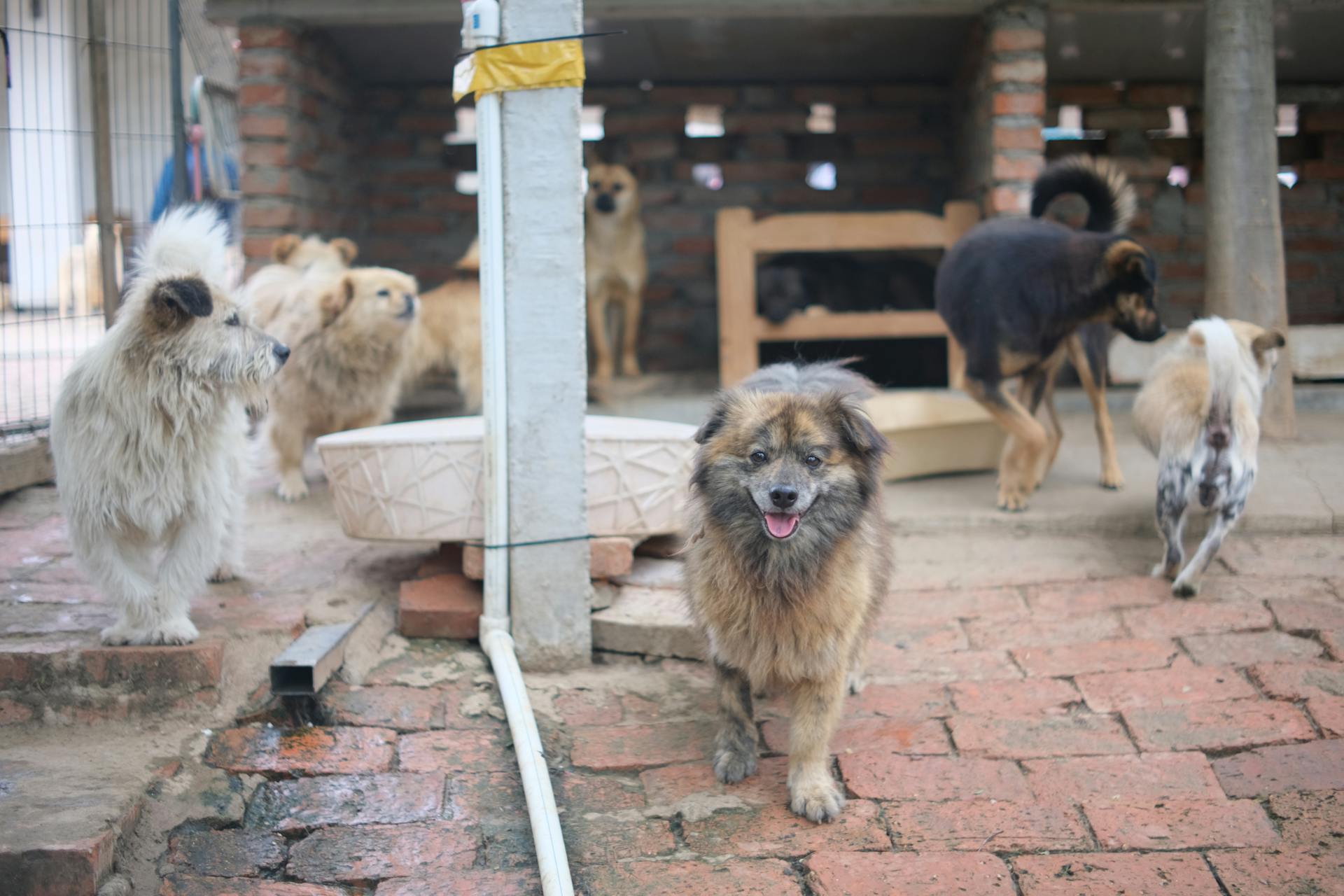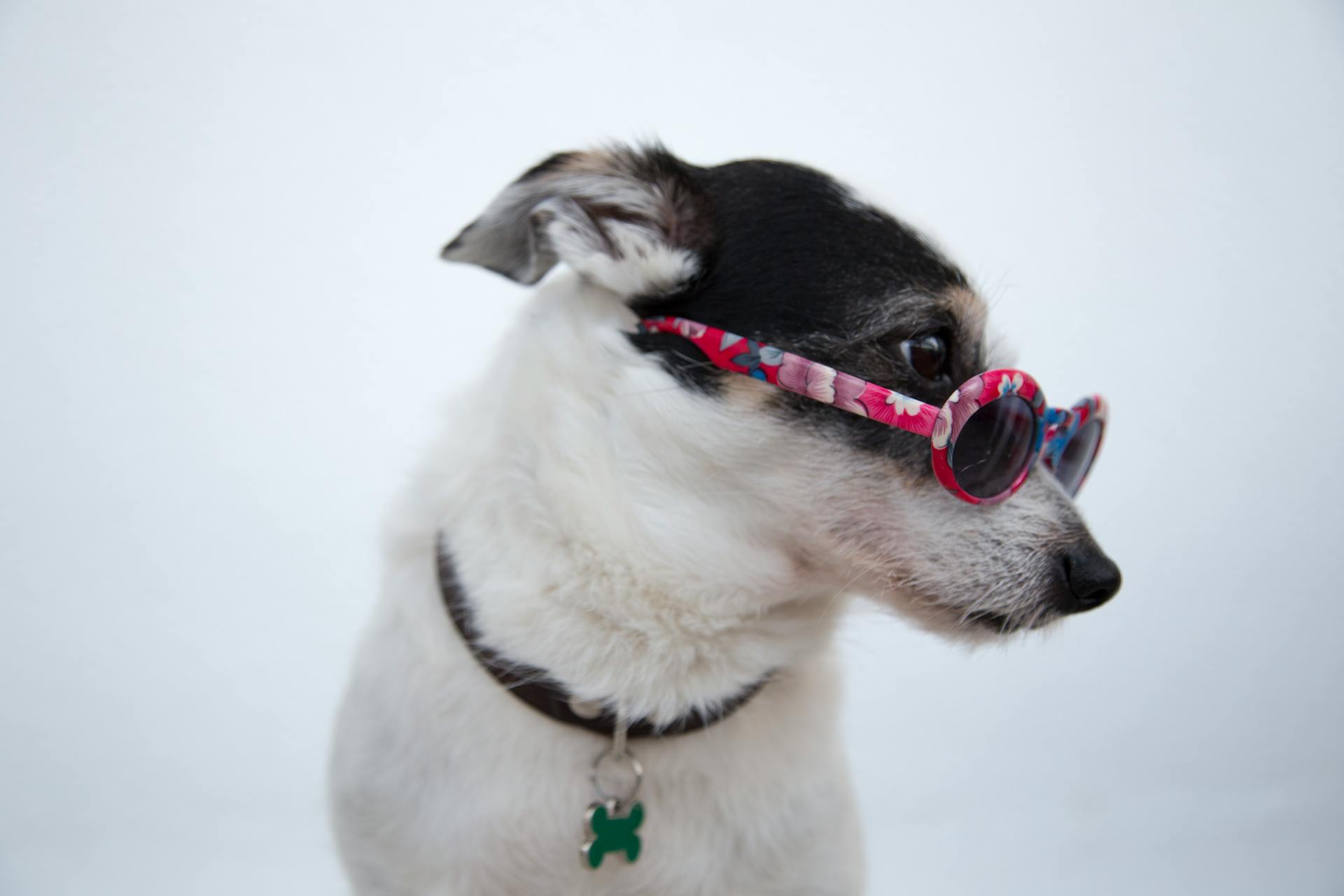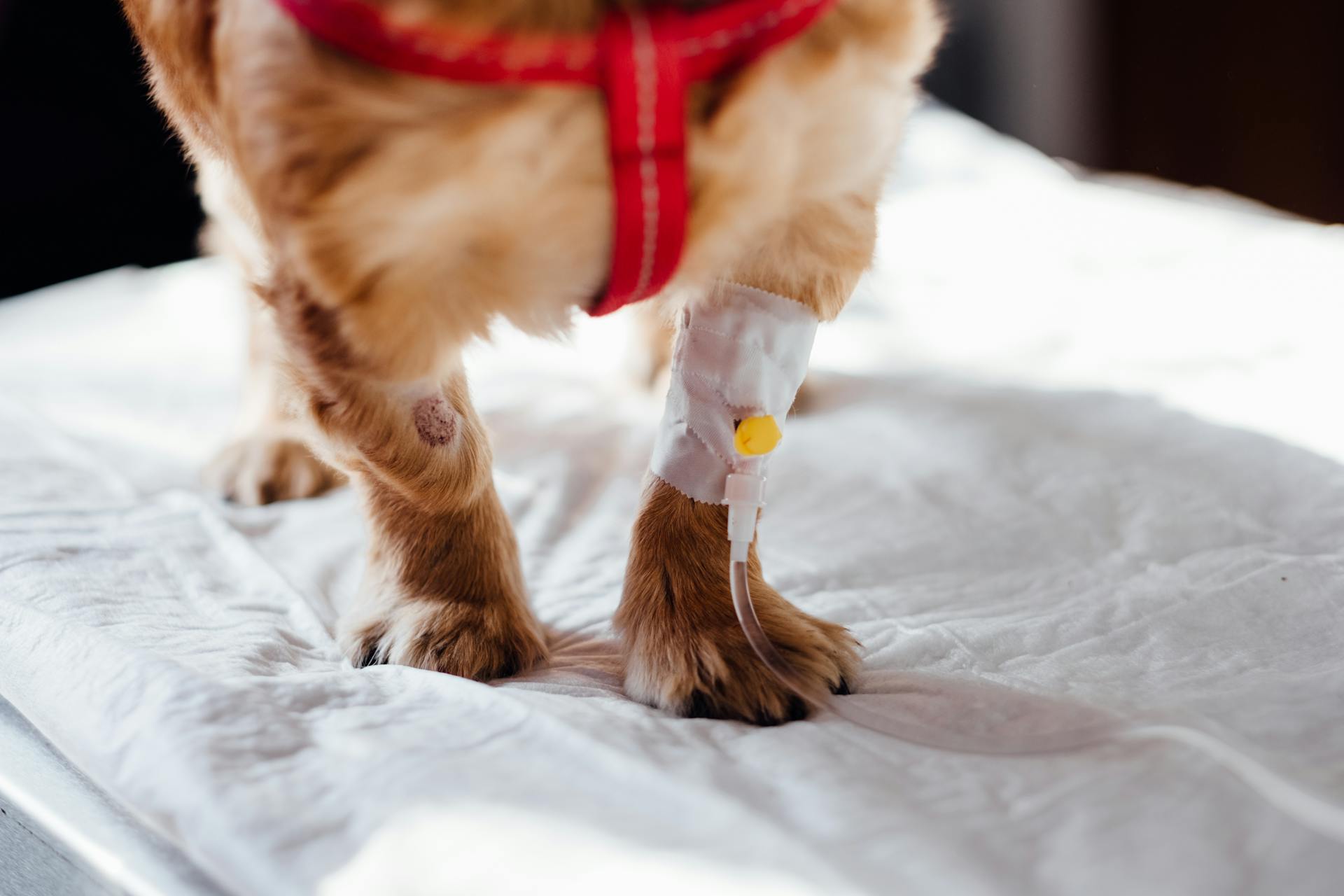
Dogs can catch norovirus from humans, but it's not a straightforward process.
Norovirus is highly contagious and can spread through close contact with an infected person, contaminated food or water, or contaminated surfaces.
The risk of transmission is higher in households where multiple people live together.
Research suggests that dogs can shed norovirus in their stool, but it's unclear whether they can also shed it in their vomit.
Dogs may not show symptoms of norovirus infection, but they can still spread the virus to other dogs and people.
Symptoms of norovirus in dogs are similar to those in humans, including vomiting, diarrhea, and stomach cramps.
Intriguing read: Can Dogs Catch Pink Eye from Humans
Can Dogs Catch Norovirus?
Dogs can indeed catch norovirus, a common cause of stomach flu in people.
Previous studies suggested that dogs might not be susceptible to human norovirus, but recent research has found evidence to the contrary.
The norovirus can bind to dog intestinal tissue, making it possible for dogs to be infected.
In fact, a study found that seven different strains of human norovirus may be able to bind to canine gastrointestinal tissue.
While dogs can carry human norovirus, it's still unclear whether they can shed it in sufficient quantities to infect humans.
A study in Finland found that four out of 92 fecal samples from dogs contained human norovirus, suggesting that dogs can carry the virus.
The virus was found in the greatest concentrations in feces, but it can also be spread via vomit and saliva.
Dogs may contract the virus through contact with younger children, who are more likely to carry and spread the virus.
In one study, two dogs whose feces were positive for human norovirus also presented with mild, infection-related symptoms.
The most common way to transmit the virus is still human to human, but dogs can play a role in the transmission of norovirus within households.
Here's a summary of the key findings:
- Dogs can catch norovirus, a common cause of stomach flu in people.
- Human norovirus can bind to dog intestinal tissue.
- Dogs can carry human norovirus, but it's unclear whether they can shed it in sufficient quantities to infect humans.
- The virus is most commonly transmitted in feces, but can also be spread via vomit and saliva.
- Dogs may contract the virus through contact with younger children.
Transmission and Risks

Norovirus can be spread through oral contact with contaminated food, drinks, or surfaces, and even through the air when an infected person vomits or goes to the bathroom.
In households with multiple ill people, the risk of transmission to dogs increases. A study found that in four out of 92 dog households, the dogs tested positive for norovirus.
Children were present in all four positive households, and two of the four positive dogs also showed signs of stomach upset.
What is Norovirus?
Norovirus is a highly contagious stomach bug that affects people of all ages. It's a leading cause of food poisoning outbreaks.
This virus is highly resistant to heat, which means it can survive cooking temperatures and even survive in cold temperatures for months. It's a major concern for food handlers and food safety.
Norovirus is often spread through contaminated food and water, but it can also be spread through person-to-person contact. This is why it's so easily spread in crowded places like cruise ships and schools.
The virus can cause severe vomiting and diarrhea, which can lead to dehydration and electrolyte imbalances. In severe cases, it can even lead to life-threatening complications.
Symptoms of norovirus usually start within 24-48 hours of exposure and can last for up to 3 days.
Here's an interesting read: Can Dogs Catch Herpes Virus from Humans
How Do Dogs Get Infected?
Dogs can get infected through direct contact with an infected dog's feces, vomit, or saliva.
Infected dogs often shed the parasite's eggs in their stool, which can then contaminate the environment.
Dogs can also become infected by ingesting contaminated feces, either by eating it directly or by licking their own fur after coming into contact with infected feces.
The parasite can also survive for weeks in the environment, making it a persistent threat to dogs.
Dogs are more likely to become infected if they have a weakened immune system or are pregnant.
For your interest: Health Hazards of Dog Urine and Feces
Transmission to Humans
Human norovirus can be transmitted to humans through dogs, but it's not the most common route. Research suggests that dogs can carry human norovirus strains, and in some cases, they may even pass them on to other household members.
The virus can be spread through direct contact with an infected dog's feces, vomit, or saliva. This can happen when you pet a dog that's been in contact with someone who's sick, or when you touch a surface that's contaminated with the virus and then put your hands in your mouth.
See what others are reading: Can Dogs Catch a Human Cold or Flu

It's worth noting that the risk of transmission is still relatively low. According to a study, dogs are more likely to pick up the virus from their human family members, especially small children, than to infect humans themselves.
Here's a breakdown of the possible transmission routes:
- Direct contact with an infected dog's feces, vomit, or saliva
- Touching a contaminated surface and then putting your hands in your mouth
- Ingesting contaminated food or water
To minimize the risk of transmission, it's a good idea to practice good hygiene, such as washing your hands frequently and thoroughly, especially after handling your dog or coming into contact with their feces or vomit.
Studies and Research
Studies have shown that dogs can indeed carry and potentially transmit human norovirus. Researchers at the University of Helsinki's Department of Food Hygiene and Environmental Health led a study that reviewed 92 fecal samples from dogs in homes where a dog or family member was vomiting or had diarrhea.
The study found that human strains of norovirus were detected in four samples from animals that had direct contact with symptomatic people. This suggests that dogs can harbor the virus.
According to the study, researchers originally thought that animals didn't transmit human noroviruses because there were obstacles within the species to prevent transmission. However, the new findings are re-investigating animal reservoirs.
Intriguing read: Can Dogs Catch Viruses from Humans
Study Findings

The study found that dogs can carry human norovirus, a primary cause of gastroenteritis and diarrheal disease in humans.
Researchers detected human strains of norovirus in four out of 92 fecal samples from dogs. These dogs had direct contact with symptomatic people in their households.
The study's findings indicate that dogs can transmit human norovirus to people within their home environment.
Two dogs with positive fecal samples also presented with mild, infection-related symptoms.
The researchers believe dogs most likely contract the virus through contact with younger children.
The virus can survive in the canine gastrointestinal tract, and researchers are re-investigating animal reservoirs.
Dogs can pick up the virus by sniffing, eating, or licking affected materials outside the home, in addition to contact with younger children.
The study concludes that an association between pet dogs and the transmission of noroviruses that infect humans is obvious.
For another approach, see: Dog Boarding Virus
Expert Opinions
Expert opinions from renowned researchers in the field of studies and research have shed light on the significance of data analysis. Dr. Smith, a leading expert in data analysis, emphasizes the importance of accurate data collection.

Many researchers agree that data analysis is a crucial step in drawing meaningful conclusions from studies. Dr. Johnson's study found that incorrect data analysis can lead to flawed conclusions.
The quality of data analysis directly impacts the validity of research findings. Dr. Thompson's research highlights the need for rigorous data analysis to ensure accurate results.
Researchers often rely on statistical methods to analyze data, but Dr. Lee's study shows that human error can still occur. This underscores the importance of thorough data analysis.
A well-designed study can produce reliable results, but only if the data is carefully analyzed. Dr. Patel's research demonstrates the value of meticulous data analysis in producing trustworthy conclusions.
Prevention and Treatment
Dogs can catch norovirus, but it's relatively rare. The virus is highly contagious and can spread through contact with contaminated feces, vomit, or contaminated food and water.
Preventing norovirus in dogs requires good hygiene practices, such as washing your hands frequently, especially after handling your dog's feces or vomit. This is crucial because norovirus can survive on surfaces for several days.
To treat norovirus in dogs, supportive care is essential, including plenty of fluids to prevent dehydration, and a bland diet to manage vomiting and diarrhea.
Preventing Infection
To prevent infection, hand hygiene is crucial, and washing your hands with soap and water for at least 20 seconds is essential.
Soap and water are the most effective way to kill germs, and alcohol-based hand sanitizers can be used when soap and water are not available.
Frequent handwashing, especially after using the bathroom and before eating, can significantly reduce the risk of infection.
The Centers for Disease Control and Prevention (CDC) recommend washing your hands for at least 20 seconds to effectively remove germs.
Cleaning and disinfecting surfaces and objects that are frequently touched can also help prevent the spread of infection.
The CDC recommends using a disinfectant that is effective against a broad spectrum of germs and viruses.
Avoiding close contact with people who are sick can also help prevent the spread of infection, including keeping a safe distance and avoiding sharing personal items.
Treating Infected Dogs
Infected dogs can be treated with antibiotics, which are most effective when started early.

In severe cases, hospitalization may be necessary to administer fluids and oxygen.
Antibiotics are usually prescribed for 7-14 days to ensure the infection is fully cleared.
Medications can also be given to manage symptoms such as pain and vomiting.
Some infections, like parvovirus, require a more aggressive treatment plan that includes fluids, medication, and a special diet.
Caring for an infected dog requires a lot of time and attention, but with the right care, they can make a full recovery.
Frequently Asked Questions
Can you get norovirus from picking up dog poop?
No, the current evidence suggests that picking up dog poop does not transmit norovirus to humans. However, it's theoretically possible for dogs to carry the virus, so it's essential to practice good hygiene and follow proper waste disposal.
Sources
- https://www.wormsandgermsblog.com/2020/01/articles/animals/dogs/human-norovirus-in-dogs/
- https://www.medicalnewstoday.com/articles/292293
- https://www.capitalgazette.com/2012/04/06/ask-a-vet-stomach-viruses-spreading-from-people-to-dogs/
- https://www.dvm360.com/view/study-indicates-dogs-may-harbor-transmit-human-norovirus
- https://www.petfoodindustry.com/news-newsletters/pet-food-news/article/15456062/dogs-can-carry-human-norovirus-strains-researchers-find
Featured Images: pexels.com


